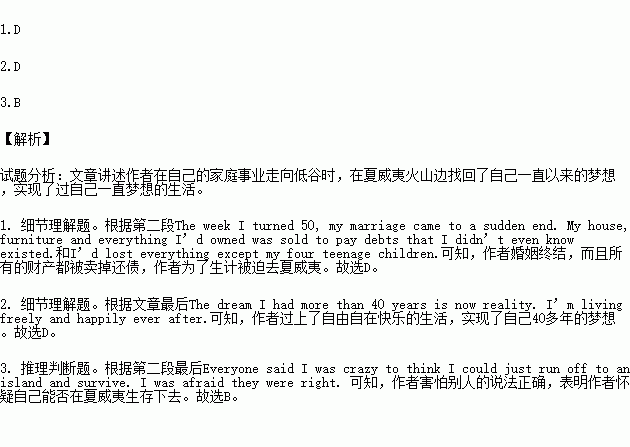题目内容
When I was eight, I saw a movie about an island that had an erupting volcano and jungles filled with wild animals. The island was ruled by a beautiful woman called Tondalaya, the Fire Goddess of the Volcano. It was a low-budget(小成本) movie, but to me, it represented the perfect life. But through the years, Tondalaya was forgotten.
The week I turned 50, my marriage came to a sudden end. My house, furniture and everything I’d owned was sold to pay debts that I didn’t even know existed. In a week I had lost my husband, my home and my parents who had refused to accept a divorce (离婚) in the family. I’d lost everything except my four teenage children. I used every penny I had to buy five plane tickets from Missouri to Hawaii. Everyone said I was crazy to think I could just run off to an island and survive. I was afraid they were right.
I worked 18 hours a day and lost 30 pounds because I lived on one meal a day. One night as I walked alone on the beach, I saw the red orange lava (火山岩) pouring out of Kilauea Volcano in the distance. It was time to live my imagination!
The next day, I quit my job, bought some art supplies and began doing what I loved. I hadn’t painted a picture in 15 years. I wondered if I could still paint. My hands trembled the first time I picked up a brush. But before an hour had passed, I was lost in the colors spreading across the canvas (画布) in front of me. And as soon as I started believing in myself, other people started believing in me, too. The first painting sold for $1,500.
The past six years have been filled with adventures. My children and I have gone swimming with dolphins, watched whales and hiked around the crater rim (火山口边缘) of the volcano. We wake up every morning with the ocean in front of us and the volcano behind us. The dream I had more than 40 years is now reality. I’m living freely and happily ever after.
1.Why did the writer go to Hawaii?
A. To realize her childhood dream.
B. To free herself from trouble.
C. To spend her holiday.
D. To make a living.
2.Which of the following is the writer’s dream?
A. Living in nature with animals.
B. Becoming a successful painter.
C. Getting close to wildlife.
D. Living a free and happy life.
3.We can infer from the passage that ________.
A. the writer’s husband took away most of her money
B. the writer wasn’t sure whether she could survive in Hawaii at first
C. the writer had never done painting before
D. the writer’s parents encouraged her to divorce

